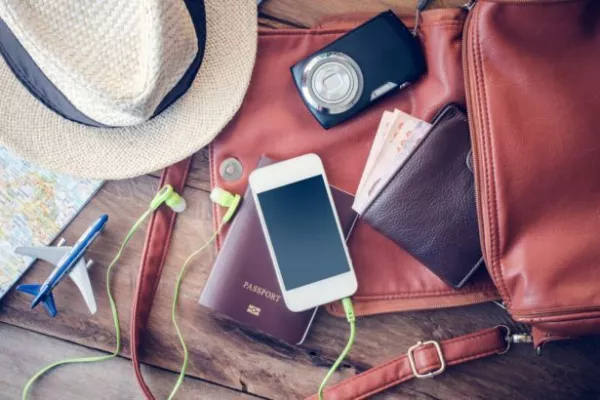Labour strife in Europe is driving expectations of more travel headaches during the busy summer season, with airports and airlines clamouring to find more workers, minimize cancelled flights and reduce delays for passengers.
On Thursday 9 June, some 1,000 SAS SAS.ST pilots in Denmark, Norway and Sweden said they could go on strike from late June, even as workers at France's Charles de Gaulle airport walked off the job, with a quarter of flights cancelled.
Airlines, battered by a slump in travel during the pandemic, have been counting on a strong summer, with fares rising to offset higher fuel costs and pilots and cabin crews making a case for higher pay due to inflation.
While budget carrier Norwegian Air NAS.OL reached a wage deal with the Norwegian union representing pilots for 2022 and 2023, crews from three budget carriers including Ryanair RYA.I, walked off the job on Wednesday 8 June.
Airport managers in Europe and Canada are struggling to quickly recruit and process new hires, even as the rebound in air travel from the pandemic-induced slump leads to cancelled flights and hours-long lines.
On Wednesday 8 June evening, German flag carrier Lufthansa LHAG.DE and its subsidiary Eurowings said they were scrapping over 1,000 flights in July, or 5% of their planned weekend capacity, due to staff shortages amid the busy vacation period.
The head of airline trade group the International Air Transport Association (IATA) has said heavy congestion also occurred before the pandemic and is now limited to certain airports, aggravated by delays to get security badges required for newly hired staff.
US Staffing Crunch
Although airports in the United States have largely avoided such heavy congestion, a staffing crunch has forced airlines to cancel flights and trim summer schedules.
Alaska Air Group Inc ALK.N last month was forced to cancel 4% of its flights because of staffing woes. Delta Air Lines DAL.N, which cancelled approximately 700 flights over the four-day Memorial Day holiday, plans to cut flights through August.
Canada's busiest airport is allowing some staff who have yet to obtain their badges to work temporarily under supervision by vetted employees, said Tori Gass, a spokeswoman for the Greater Toronto Airports Authority.
The temporary pass was introduced at Toronto Pearson International Airport in response to the large volume of appointments for restricted area identity cards (RAIC), Gass said. It takes approximately 45 days to get the cards.
Transport Canada said that it received 13,722 applications nationally for clearances required for such employees as airport ramp agents or baggage handlers in the first quarter of 2022, up from 5,968 requests during the same period in 2021.
Pearson is wrestling with planes stuck at gates and hours-long security lines due to staffing shortages.
Canadian Transport Minister Omar Alghabra on Wednesday 8 June said that he was working with partners to bring in more screening officers.
The country's largest carrier Air Canada AC.TO cancelled almost 10% of flights from the airport during the first week of June, according to data from Cirium, an aviation analytics company. Air Canada said its overall flight completion remains high and a combination of factors, including air traffic control limitations have "forced airlines to cancel flights."
In Europe, Dublin and Heathrow airports are recruiting screeners, while Schiphol Airport in Amsterdam is raising wages for staff.
Spain on Tuesday 7 June announced the hiring of 500 additional police to staff passport controls at busy airports and tourist destinations including Madrid.
Spain's interior minister attributed reports of congestion at border controls to multiple flights arriving at the same time. But CEHAT, the country's largest business group for hotels and lodging, said officials should have prepared for the congestion, knowing that free travel of British citizens to Spain was ending due to Brexit.
"This situation should not have caught us off guard," CEHAT president Jorge Marichal said in a statement on Wednesday 8 June.
Amsterdam's Schiphol Airport Limits Number Of Summer Passengers
The above news was followed by news that Amsterdam's Schiphol Airport on Thursday 16 June set a cap on the number of passengers it will handle during the summer travel season, citing labour shortages.
The move by one of Europe's busiest airports means that airlines including KLM, the Dutch subsidiary of Air France-KLM AIRF.PA, will have to cancel an unspecified number of flights.
Schiphol said it would accept around 70,000 passengers a day, approximately 16% - or 13,500 seats per day - fewer than airlines had planned.
"Setting a limit now means that the large majority of travellers will be able to travel from Schiphol in a safe and responsible way," CEO Dick Benschop said in a statement.
KLM said that it would hold Schiphol responsible for the financial impact of the move.
"It cannot be so that the people who use the airport structurally pay for Schiphol's capacity problems," the airline said.
KLM said that it did not expect to have to cancel existing bookings "on a large scale".
Airports around Europe have suffered from labour and logistics issues as passenger travel surged following the end of COVID-19 lockdowns. Airlines including Lufthansa and easyJet have already announced plans to reduce flights this summer.
Travel at Schiphol has been disrupted frequently since April due to shortages of security workers and baggage handlers. Hundreds of flights have been cancelled, and long lines have become routine.
Germany's Lufthansa LHAG.DE intends to cancel 900 domestic and European flights at its hubs in Frankfurt and Munich in July, on Fridays, Saturdays and Sundays - approximately 5% of capacity. Its budget carrier Eurowings is dropping hundreds of flights for the same period.
EasyJet EZJ.L in Germany will drop around 12 flights per day to and from Berlin airport - a total of 1,000 - from 1 June to 31 August.
ANALYSIS-Air fares And Staff Gaps Cast A Shadow On Transatlantic Travel Rebound
All of the above news was followed by news that airlines expect the end of COVID testing requirements in North America to accelerate a rebound in transatlantic traffic - but soaring fares due to surging fuel costs and staffing shortages may slam the brakes on rising demand in the world's largest international travel market.
A US requirement that arriving air travellers test negative for COVID-19 had been blamed by carriers for dampening demand.
But a week after the White House scrapped the rule, airlines are reporting a surge of interest in international travel.
That's a bright spot as the industry prepares an annual meeting of the International Air Transport Association (IATA) in Qatar.
IATA director general and former head of British Airways Willie Walsh expects airlines to prioritize key transatlantic routes that for years drove a big slice of industry profits.
"I think they'll reduce capacity in other areas," Walsh told Reuters ahead of the June 19-21 Doha gathering.
United Airlines UAL.O says searches for international travel from the United States, including Europe, have increased.
Similarly, travel management platform TripActions reported a 23% jump in international flight bookings to the US, helped by higher demand from Northern Europe.
US airline executives have been advising customers not to delay their bookings if they are planning to go to Europe as the demand this summer is "on fire".
The surge in demand, however, comes at a time when carriers on both sides of the Atlantic are grappling with staffing shortages, forcing them to cut capacity.
In Europe, widespread labor strife, including short-term strikes by cabin crew over pay, has left passengers facing long-lines and flight cancellations.
That's raising questions over whether airlines and even airports have enough resources to meet increased demand. Transatlantic traffic has already reached 85% of 2019 levels, according to aviation analytics company Cirium.
Amsterdam's Schiphol Airport on Thursday 16 June set a cap on the number of passengers it will handle during the summer travel season, citing labor shortages and forcing airlines to cut flights.
The move by one of Europe's busiest airports means that airlines including KLM, the Dutch subsidiary of Air France-KLM AIRF.PA, will have to cancel an unspecified number of flights.
"For consumers, it means higher fares and a travel experience more prone to disruption and frustration," said Peter McNally, Global Sector Lead for Industrials Materials and Energy at research firm Third Bridge.
The transatlantic is the world's most lucrative travel market. In 2019, before the pandemic, transatlantic routes accounted for between 11% and 17% of passenger revenues at the big three U.S. carriers - United Airlines UAL.O, Delta Air Lines DAL.N and American Airlines AAL.O.
Air Canada AC.TO, which indirectly flies US passengers abroad through its Canadian hubs, was witnessing stronger demand for Europe even before Washington rescinded COVID testing requirement. The Montreal-based airline, the largest foreign carrier in the US, told Reuters that bookings from some U.S. cities for Europe are above 2019 levels.
For large traditional players like British Airways-owner IAG ICAG.L, Lufthansa LHAG.DE and Air France-KLM, the US market is key to profits as they tend to be more reliant on transatlantic revenues than US competitors.
United Airlines has the biggest exposure to international traffic among major US carriers. It plans to expand its transatlantic network by 25% this summer compared to 2019 levels even as its overall capacity is projected to be lower.
"No airline is flying more across the Atlantic Ocean this summer than us," chief executive Scott Kirby said on LinkedIn.
Kirby and other airline CEOs are betting healthy US household savings as well as strong pent-up demand will help fill flights despite rising fares and growing risks of an economic recession in the United States.
Soaring Fares
Inflation is at a record high in both the United States and Europe, with Russia's invasion of Ukraine and China's COVID-related lockdowns worsening price pressures. Central banks are under pressure to raise interest rates at a faster clip, dimming global economic prospects.
Meanwhile, jet fuel costs have more than doubled in the past year. Booming travel demand is helping carriers offset fuel costs with higher fares.
Average economy fares for a return flight from the US to the EU are up 26% from their 2019 levels, TripActions says.
Thus far, there is little evidence of soaring costs hurting travel spending. Delta this month said consumer spending through its co-brand American Express cards is up 140% this year compared to 2019 levels.
Yet, some indicators are flashing warning signs.
A survey of US travellers last month by Cowen and Co. found a slight drop in sentiment on the back of growing macro-economic concerns and rising air fares. An Adobe report this week also showed a slowdown in U.S. airline bookings in May.
"The question is ... if your rent goes, up and your electric and gas bills go up and your fuel goes up, will that impact your disposable income that you can spend on flights," said George Dimitroff, an analyst with Ascend by Cirium.
London's Gatwick Caps Summer Flight Numbers Over Staff Shortages
All of the above news was followed by news that London's Gatwick airport said on Friday 17 June that it will limit the number of flights during the summer travel season in light of continuing labour shortages, a move that will force airlines to cancel some flights.
Britain's second-largest airport will cap flights at 825 per day in July and 850 in August in order to avoid chaos and combat same-day cancellations by airlines, a decision it said comes after a rapid upturn in air traffic levels.
Gatwick usually operates about 900 flights on peak days in August.
Airports around Europe have suffered from labour and logistics issues as passenger travel surged following the end of COVID-19 lockdowns, with British airports in particular facing chaos as a school half-term holiday coincided with the Platinum Jubilee holiday weekend.
Airlines including Lufthansa LHAG.DE and EasyjetEZJ.L have already announced plans to reduce flights this summer.
"It is clear that during the Jubilee week a number of companies operating at the airport struggled in particular, because of staff shortages," Stewart Wingate, Gatwick's chief executive, said in a statement.
Wingate said the decision will allow the airlines and passengers to plan in advance and avoid last-minute cancellations.
Earlier this month, Britain's transport secretary, Grant Shapps, told airlines to stop selling tickets for flights they cannot staff after a spate of cancellations.
Europe's Summer Of Discontent Reveals Travel Sector Labour Crisis
All of the above news was followed by news that after 21 years as a service agent at Air France AIRF.PA, Karim Djeffal left his job during the COVID-19 pandemic to start his own job-coaching consultancy.
"If this doesn't work out, I won't be going back to the aviation sector," says the 41-year-old bluntly. "Some shifts started at 4 a.m. and others ended at midnight. It could be exhausting."
Djeffal offers a taste of what airports and airlines across Europe are up against as they race to hire thousands to cope with resurgent demand, dubbed "revenge travel" as people seek to make up for vacations lost during the pandemic.
Airports in Germany, France, Spain and the Netherlands have tried offering perks including pay rises and bonuses for workers who refer a friend.
Leading operators have already flagged thousands of openings across Europe. But the industry says European aviation as a whole has lost 600,000 jobs since the start of the pandemic.
Yet the hiring blitz can’t come fast enough to erase the risk of cancelled flights and long waits for travellers even beyond the summer peak, analysts and industry officials say.
The summer when air travel was supposed to return to normal after a two-year pandemic vacuum is in danger of becoming the summer when the high-volume, low-cost air travel model broke down - at least in Europe's sprawling integrated market.
Labour shortages and strikes have already caused disruption in London, Amsterdam, Paris, Rome and Frankfurt this spring.
Airlines such as low-cost giant easyJet EZJ.L are cancelling hundreds of summer flights and new strikes are brewing in Belgium, Spain, France and Scandinavia.
As industry leaders head to a summit in Qatar this week, a major theme will be who bears responsibility for the chaos between airlines, airports and governments.
"There is a lot of mud-slinging but every side is at fault in not coping with the resurgence of demand," said James Halstead, managing partner at consultancy Aviation Strategy.
The aviation industry says it has lost 2.3 million jobs globally during the pandemic, with ground-handling and security hardest hit, according to Air Transport Action Group which represents the industry.
Many workers are slow to return, lured by the 'gig' economy or opting to retire early.
"They clearly have alternatives now and can switch jobs," said senior ING economist Rico Luman.
While he expects travel pressure will ease after the summer, he says shortages may persist as older workers stay away and critically, there are fewer younger workers willing to replace them.
"Even if there is a recession, the labour market will remain tight at least this year," he said.
Low Morale
A major factor slowing hiring is the time it takes new workers to get security clearance, in France up to five months for the most sensitive jobs, according to the CFDT union.
Marie Marivel, 56, works as a security operator screening luggage at CDG for approximately €1,800 a month post-tax.
She says shortages have led to staff being overworked. Stranded passengers have been turning aggressive. Morale is low.
"We have young people who come and leave again after a day," she says. "They tell us we're earning cashiers' wages for a job with so much responsibility."
After much disruption in May, the situation in France is stabilising, said Anne Rigail, chief executive of the French arm of Air France-KLM AIRF.PA.
Even so, Paris's Charles de Gaulle and Orly airports, where one union has called a strike on July 2, still need to fill a total of 4,000 vacancies, according to the operator.
And in the Netherlands, where unemployment is much lower at 3.3%, unfilled vacancies are at record highs and KLM's Schiphol hub has seen hundreds of cancelled flights and long queues.
Schiphol has now given a summer bonus of 5.25 euros per hour to 15,000 workers in security, baggage handling, transportation and cleaning - a 50% increase for those on minimum wage.
"That's of course huge, but it still isn't enough," said Joost van Doesburg of union FNV.
"Let's be honest, the last six weeks have not really been an advertisement for coming to work at the airport."
Schiphol and London's Gatwick last week unveiled plans to cap capacity during the summer, forcing more cancellations as airlines, airports and politicians bicker over the crisis.
Blame Game
Luis Felipe de Oliveira, head of global airports association ACI, told Reuters airports are being unfairly blamed and airlines should work harder to address queues and rising costs.
Willie Walsh, head of the International Air Transport Association, the global airline industry group meeting in Qatar, has dismissed talk of a breakdown in air travel as "hysteria".
Walsh in turn blames part of the disruption on the actions of "idiot politicians" in places like Britain where frequent changes in COVID policy discouraged hiring.
The June 19-21 IATA meeting is expected to signal relative optimism about growth tempered by concerns over inflation.
Such gatherings have for years portrayed the industry as the positive face of globalisation, connecting people and goods at ever more competitive fares.
But the European labour crisis has exposed its vulnerability to a fragile labour force, with the resulting rise in costs likely to push fares higher and add pressure for restructuring.
In Germany, for example, employers say many ground workers have joined online retailers such as Amazon AMZN.O.
"It's more comfortable packing a hair dryer or a computer in a box than heaving a 50-pound suitcase crawling into the fuselage of an airplane", said Thomas Richter, chief of the German ground-handling employers' association ABL.
Analysts say the labour squeeze may raise costs beyond the summer but it is too early to tell whether the industry must step back from the pre-pandemic model of ever-rising volumes and cost-cutting, which generated new routes and kept fares low.
For some departing employees, however, Europe's torrid summer signals a wake-up call for passengers and bosses alike.
"I personally think the very cheap flying...I just don't know how they can really keep up with that," said a former British Airways cabin crew member, 58, who has taken redundancy.
Global Airlines To Narrow Losses In 2022 As Outlook Improves
All of the above news was followed by news that a sharp bounce-back in air travel from the pandemic will allow global airlines to narrow losses this year and possibly claw their way back to profit in 2023, an industry body said as it upgraded widely watched forecasts on Monday 20 June.
Global airlines are now expected to post a $9.7 billion loss in 2022, in a sharp improvement from a revised $42.1 billion loss in 2021, the International Air Transport Association said.
The 2022 forecast is nearly $2 billion better than an earlier expectation of a $11.6 billion loss.
Last year's losses also improve on an earlier forecast of $52 billion, though airlines meeting in Qatar bave been warned high oil prices and inflation risk denting the fragile recovery.
"Our industry is now leaner, tougher, and nimbler," IATA director General Willie Walsh told an annual meeting of more than 100 airline leaders. "Industry-wide profit should be on the horizon in 2023," he added.
ANALYSIS-Europe's Summer Of Discontent Reveals Travel Sector Labour Crisis
All of the above news was followed by news that after 21 years as a service agent at Air France AIRF.PA, Karim Djeffal left his job during the COVID-19 pandemic to start his own job-coaching consultancy.
"If this doesn't work out, I won't be going back to the aviation sector," says the 41-year-old bluntly. "Some shifts started at 4 a.m. and others ended at midnight. It could be exhausting."
Djeffal offers a taste of what airports and airlines across Europe are up against as they race to hire thousands to cope with resurgent demand, dubbed "revenge travel" as people seek to make up for vacations lost during the pandemic.
Airports in Germany, France, Spain and the Netherlands have tried offering perks including pay rises and bonuses for workers who refer a friend.
Leading operators have already flagged thousands of openings across Europe.
Yet the hiring blitz can’t come fast enough to erase the risk of cancelled flights and long waits for travellers even beyond the summer peak, analysts and industry officials say.
The summer when air travel was supposed to return to normal after a two-year pandemic vacuum is in danger of becoming the summer when the high-volume, low-cost air travel model broke down - at least in Europe's sprawling integrated market.
Labour shortages and strikes have already caused disruption in London, Amsterdam, Paris, Rome and Frankfurt this spring.
Airlines such as low-cost giant easyJet EZJ.L are cancelling hundreds of summer flights and new strikes are brewing in Belgium, Spain, France and Scandinavia.
On Monday 20 June the British carrier said that it was cutting even more services in the busy summer period to help manage problems including ground staff shortages and flight caps at London Gatwick and Amsterdam.
As industry leaders hold their annual summit in Qatar this week, a major theme will be who bears responsibility for the chaos between airlines, airports and governments.
"There is a lot of mud-slinging, but every side is at fault in not coping with the resurgence of demand," said James Halstead, managing partner at consultancy Aviation Strategy.
Aviation lost 2.3 million jobs globally during the pandemic, with ground-handling and security hardest hit, according to industry lobby group the Air Transport Action Group.
Many workers are slow to return, lured by the 'gig' economy or opting to retire early.
"They clearly have alternatives now and can switch jobs," said senior ING economist Rico Luman.
While he expects travel pressure will ease after the summer, he says shortages may persist as older workers stay away and, critically, fewer younger workers are willing to replace them.
"Even if there is a recession, the labour market will remain tight at least this year," he said.
Low Morale
A major factor slowing hiring is the time it takes new workers to get security clearance - in France, up to five months for the most sensitive jobs, according to the CFDT union.
Marie Marivel, 56, works as a security operator screening luggage at CDG for around 1,800 euros a month post-tax.
She says shortages have led to staff being overworked. Stranded passengers have been turning aggressive. Morale is low.
"We have young people who come and leave again after a day," she says. "They tell us we're earning cashiers' wages for a job with so much responsibility."
After much disruption in May, the situation in France is stabilising, said Anne Rigail, chief executive of the French arm of Air France-KLM AIRF.PA.
Even so, Paris's Charles de Gaulle and Orly airports, where one union has called a strike on July 2, still need to fill a total of 4,000 vacancies, according to the operator.
And in the Netherlands, where unemployment is much lower at 3.3%, unfilled vacancies are at record highs and KLM's Schiphol hub has seen hundreds of cancelled flights and long queues.
Schiphol has now given a summer bonus of 5.25 euros per hour to 15,000 workers in security, baggage handling, transportation and cleaning - a 50% increase for those on minimum wage.
"That's of course huge, but it still isn't enough," said Joost van Doesburg of union FNV.
"Let's be honest, the last six weeks have not really been an advertisement for coming to work at the airport."
Schiphol and London's Gatwick last week unveiled plans to cap capacity during the summer, forcing more cancellations as airlines, airports and politicians bicker over the crisis.
Blame Game
Luis Felipe de Oliveira, head of global airports association ACI, told Reuters airports are being unfairly blamed and airlines should work harder to address queues and rising costs.
Willie Walsh, head of the International Air Transport Association, the global airline industry group meeting in Qatar, has dismissed talk of a breakdown in air travel as "hysteria".
"It has been bad for some consumers, and clearly airlines and airports want to apologise for that," he told Reuters.
"But we need to put it into context; it's not at every airport...I haven't witnessed the horror stories I read about in the press," he said on the sidelines of his group's annual meeting in Doha.
Walsh has already blamed part of the disruption on the actions of "idiot politicians" in places like Britain where frequent changes in COVID policy discouraged hiring.
The June 19-21 IATA meeting signals relative optimism about growth tempered by concerns over inflation.
Such gatherings have for years portrayed the industry as the positive face of globalisation, connecting people and goods at ever more competitive fares.
But the European labour crisis has exposed its vulnerability to a fragile labour force, with the resulting rise in costs likely to push fares higher and add pressure for restructuring.
In Germany, for example, employers say many ground workers have joined online retailers such as Amazon AMZN.O.
"It's more comfortable packing a hair dryer or a computer in a box than heaving a 50-pound suitcase crawling into the fuselage of an airplane", said Thomas Richter, chief of the German ground-handling employers' association ABL.
Analysts say the labour squeeze may raise costs beyond the summer, but it is too early to tell whether the industry must step back from the pre-pandemic model of ever-rising volumes and cost-cutting, which generated new routes and kept fares low.
For some departing employees, however, Europe's torrid summer signals a wake-up call for passengers and bosses alike.
"I personally think the very cheap flying...I just don't know how they can really keep up with that," said a former British Airways cabin crew member, 58, who has taken redundancy.
Head Of Airlines Group IATA Confident Industry Will Return To Profitability In 2023
All of the above news was followed by news that the head of the world's biggest airline trade body said on Monday 20 June that he remains confident that the industry will return to profitability in 2023, even though there may still be a disconnect between capacity and demand until the first quarter.
Speaking on a panel in Doha, International Air Transport Association (IATA) director general Willie Walsh added that he is "not concerned" about the current demand and supply environment.
Airlines Blast Governments For Messy Pandemic Response
All of the above news was followed by news that global airlines hit out at governments on Monday 20 June for what the industry's leading ambassador termed their "shambolic" handling of the COVID-19 crisis, and urged nations to rip up the playbook of widespread border closures for any future pandemics.
"The cost of government mismanagement was substantial. It devastated economies, disrupted supply chains and destroyed jobs," Willie Walsh, director general of the International Air Transport Association, told an industry summit.
Airlines have themselves been under fire from governments and consumer groups for disruption as travel demand resumes more briskly than expected, but the airline industry sees a common thread in uncoordinated government responses to the crisis.
"There was one virus, but each government invented its own methodology," Walsh told the industry's annual meeting. "How can anybody have confidence in such a shambolic, uncoordinated, and knee-jerk response by governments?"
Speaking to more than 100 airline bosses gathered in Qatar, Walsh cited research showing that border closures had barely arrested the spread of the pandemic while virtually halting international travel and crippling economies.
"Closing borders is not the right response to a pandemic," Walsh said.
Governments worldwide lent more than $200 billion of support to airlines to curb bankruptcies during the pandemic, according to UK-based aviation consultancy Ishka.
Airlines expected to narrow losses in 2022 and may make a profit next year as air travel recovers, IATA said.
Walsh said confused government policies had also worsened disruption seen particularly in Europe as flying restarted.
Britain has criticised airlines for delays and called on the industry to refrain from overbooking flights they can't operate.
"Bad Habit"
Recent delays have been widely blamed on labour shortages as an increasing number of people desert low-paid airport work for flexible working practices that prospered during the pandemic.
The head of host airline Qatar Airways cast doubt on the shift in labour trends.
"People got into a bad habit of working from home," Chief Executive Akbar Al Baker told a news conference.
"They feel they don't need go to an industry that really needs hands-on people," he said, adding shortages in airport staff could restrict the post-crisis growth of airlines.
Airlines and airports frequently spar at the industry's major gatherings, with government interests and jobs at stake.
Walsh, who built a reputation as a bruiser in clashes with unions and governments as former head of British Airways, rallied under-pressure CEOs with an attack on the practice of hiking airport fees to recoup revenues lost during the crisis.
"Try that in a competitive business. 'Dear Valued Customer, we are charging you double for your coffee today because you could not buy one yesterday'. Who would accept that?" he said.
Airports have said they are unfairly criticised by airlines and called on them to focus on resolving their own problems.
Airport Service Providers Could Sue Over Flight Caps, Says Swissport Boss
All of the above news was followed by news that airports capping flight numbers this summer could face legal challenges from service providers to recoup costs after recruiting workers based on original schedules, the chief executive of aviation services company Swissport said on Monday 20 June.
Airports including London's Gatwick and Amsterdam's Schiphol have said in recent days that they would offer fewer flights this summer than originally planned, citing a labour crunch that has left them struggling to cope with surging travel demand.
"I think that there's going to be some challenges, I suspect legally, to putting caps on airlines," Swissport CEO Warick Brady told Reuters at an airline industry event in Qatar.
"We recruited enough people for the summer schedule and they cut the schedules, so we now have too many people. We are going to have a cost overhang because they are cutting."
Summer schedules are being cut in the face of mounting public criticism of airports over huge delays. Passengers have often had to wait hours in snaking queues through security and immigration, with some then missing their flights.
Swissport, which provides passenger and cargo handling services at airports around the world, including Schiphol, is offering hiring and retention bonuses as it looks to recruit about 15,000 new employees this year, Brady said.
He said governments should make it easier to recruit workers, but he also criticised airports that ramped up flights without giving service providers enough time to hire the necessary staff.
Industry executives have criticised processes for airport staff to obtain security permits needed to start work, which they say could be done quicker without taking shortcuts.
International Air Transport Association (IATA) director general Willie Walsh told Reuters it was disappointing that airports were capping summer schedules, but that it was better to do it now than to cancel flights on the day of service.
High Fares, Rising Economic Worries Could Weigh On Airline Recovery
All of the above news was followed by news that pent-up demand from the pandemic means consumers are weathering high airfares, but as summer ends and inflation and interest rate rises begin to bite, there are growing questions over whether the appetite for travel is sustainable.
Global airlines are now expected to post a $9.7 billion loss in 2022, a sharp improvement from a revised $42.1 billion loss in 2021, the International Air Transport Association (IATA) said on Monday 20 June, and to possibly claw their way back to profit in 2023.
But earnings remain well short of pre-pandemic levels as highly indebted carriers grapple with fresh challenges from rising fuel costs and high wages bills that they are attempting to pass on to consumers in the form of higher fares.
"We have a certain degree of insensitivity to prices this year," IATA Chief Economist Marie Owens Thomsen said, citing high household savings rates during the pandemic and pent-up travel demand. "That could fade into next year."
Industry leaders gathering at IATA's annual meeting in Doha said bookings generally looked very strong for the next few months, but there was less certainty beyond that.
"The demand is pent up. It is revenge travel," Malaysia Airlines Chief Executive Izham Ismail said. "Airfares have gone up tremendously. It is not only in Malaysia or Malaysia Airlines – it is throughout the industry globally. If the price continues to be high the demand will taper off."
IATA forecasts yields, a proxy for airfares, will rise by 5.6% this year globally.
Air New Zealand AIR.NZ Chief Executive Greg Foran said fares at his airline were now running 20% to 25% above pre-COVID levels, in part to cover fuel prices that have more than doubled. Read full story
"We are communicating to our customers and letting them know ... what they're seeing in ticket prices is not Air New Zealand trying to recover money that it lost over the last 800-plus days. It's about dealing with cost pressures that we have in front of us today," he said.
Consumers in many countries are now facing higher prices for everyday items such as groceries and gasoline that are rising faster than wages.
To date, that has not hit the appetite for travel, with many having saved up during the pandemic when many borders were closed and holidays were postponed.
Hawaiian Airlines Chief Executive Peter Ingram said demand from the U.S. mainland and Canada was "incredibly robust", with capacity running around 15% above pre-pandemic levels.
"It's impossible not to be aware of the fact that we're seeing a lot of inflation in the United States. But as we look at the demand right now, we aren't really seeing any effects," he said. "That's not to say we won't see some as the year goes on. But right now, all the demand indicators are very strong."
IATA Director General Willie Walsh also played down concerns of a so-called "demand cliff" that would spell a short-lived recovery.
"I don't think it's a flash in the pan," he said. "I think there is some pent-up demand being fulfilled at the moment, but you've got to remember we're still well below where we were in 2019."
"So I think there's still a lot of ground to make up before we can get into the debate as to whether we'll see that taper off."
But in India, where airlines are entering a traditionally lower travel period in July to September during monsoon season, there are rising concerns about the sustainability of demand given airfares have not fully covered the impact of rising fuel prices, Vistara Chief Executive Vinod Kannan said.
"We have to cross our fingers, wish, pray and see what happens," he said of the low season. "Fare increases can help you to a certain extent. But if your demand drops off, you're back to square one."
FACTBOX-Europe's Summer Travel Chaos
All of the above news was followed by news that strikes and staff shortages are forcing airlines to cancel thousands of flights and causing hours-long queues at major airports, dashing hopes of a sizzling first summer after COVID lockdowns.
Here is a summary of some of the developments:
LABOUR UNREST:
After sweeping job cuts and pay cuts when COVID-19 brought travel to a grinding halt, staff across the industry from pilots to baggage handlers are asking for big pay increases and better working conditions.
Norwegian Air NAS.OL earlier in June agreed a 3.7% pay rise for pilots among other benefits, in a sign of what other airlines may have to offer to avoid labour strife.
** Heathrow
IAG-owned ICAG.L British Airways check-in staff at Britain's busiest airport may strike next month over a pandemic-driven pay cut they say has not been fully restored.
** Brussels
A day of strikes in Belgium over the cost of living forced Brussels Airport to cancel all departing flights on Monday 20 June and halted many bus services across the country.
** Charles de Gaulle, Paris
Workers at France's main airport went on strike on 9 June to demand a €300 per month increase and better working conditions, leading to the cancellation of 25% of flights. Further action is planned for 2 July.
** Ryanair RYA.I
Seven unions from Italy, France, Portugal, Belgium and Spain warned in May cabin crew could launch a strike this summer if the airline had no "meaningful response" to their demands for better working conditions. Since then, they have announced plans to strike in all five countries in late June or early July.
** SAS AB SAS.ST
Some 1,000 SAS pilots in Denmark, Norway and Sweden could walk out from late June over disagreements over wages and cost-cutting plans at the struggling Nordic airline.
REDUCED SUMMER SCHEDULES:
EasyJet on Monday 20 June said that it was cutting thousands more flights this summer in the latest example of airlines cutting capacity, while airports, including Gatwick and Schiphol, are limiting the volume of passengers they will handle over the summer.
HIRING SPREE AND INCENTIVES:
Airports and airlines are scrambling to hire more workers from pilots to security and border control staff and baggage handlers after many left during the COVID-19 crisis.
Industry executives say it is hard to recruit for often physically demanding, relatively low paid work at airports often located out of town. Training staff and getting them security clearance to work at airports also takes months.
** Schiphol has agreed to pay 15,000 cleaners, baggage handlers and security staff €5.25 extra per hour during the summer.
One of Europe's busiest airports needs to hire 500 security staff. Before the pandemic, there were 68,000 workers in and around the airport, now there are 58,000.
** The Portuguese government plans to more than double border control staff at the country's six airports by 4 July.
** In Spain, the police will hire 500 more staff taking the total to 1,700 deployed at the country's busiest airports, including Madrid and Barcelona.
** At German airports, around 20% of positions in security, check-in and aircraft handling are vacant, according to Ralph Beisel, general manager at the airport association ADV.
There is a shortfall of 2,000 workers in ground handling.
The country's aviation lobby - airlines, airports and ground service providers - has asked the federal government to allow them to hire 2,000 temporary workers from Turkey.
** Charles de Gaulle and Orly airports in Paris need to fill 4,000 jobs mainly in security, maintenance and travel retail, according to airport operator Groupe ADP and the CDG Alliance.
More than 20,000 people were laid off at Charles de Gaulle during the pandemic, according to the CGT union.
Airport security company ICTS which operates at Charles de Gaulle is offering a one-off 180 euro bonus to those delaying their vacation until after 15 September and €150 for staff who sign up new recruits, according to a CGT union representative.
Airlines Upbeat On Recovery But Labour Shortages May Hurt Growth
All of the above news was followed by news that global airlines battered by COVID-19 seem confident of narrowing their losses but still face challenges such as labour shortages at airports which could restrict post-crisis growth, industry executives at a summit in Doha said.
Recent flight delays and cancellations have been widely blamed on a lack of staff as an increasing number of people desert low-paid airport work for flexible working practices that prospered during the pandemic.
The head of host airline Qatar Airways, Akbar Al Baker, said labour shortages will be a big challenge in the coming months, though he added that his airline is "inundated with job applications".
"People got into a bad habit of working from home," Al Baker told a news conference.
"They feel they don't need to go to an industry that really needs hands-on people," he said, adding shortages in airport staff could hurt growth.
Emirates airline president Tim Clark said that the Dubai carrier had been told by authorities at London Heathrow to axe an A380 flight there at short notice at the weekend, resulting in disruption.
But he urged the industry not to waste time bickering.
"The airport side of things have got to sort out their labor supply in critical areas of baggage, check-in, baggage systems. Get on with the job. There's a lot of the blame game, everybody at each other's throats ... Guys, just get the job done."
Clark added: "Do I see this sorting itself out over the next few months? Yes"
JetBlue Airways Corp JBLU.O CEO Robin Hayes, speaking about industry labour shortages on a panel in Doha, said he is confident that the industry will get back to "a new normal" over the next two to three years.
Global airlines went on the offensive at the summit, criticising governments and airports over their handling of the recovery from the pandemic.
"The cost of government mismanagement was substantial. It devastated economies, disrupted supply chains and destroyed jobs," Willie Walsh, director general of the International Air Transport Association, told the sector's annual meeting of more than 100 airline bosses.
Airlines have themselves been under fire from governments and consumer groups for disruption as travel demand resumes more briskly than expected, but the airline industry sees a common thread in uncoordinated government responses to the crisis.
"There was one virus, but each government invented its own methodology," Walsh told the conference. "How can anybody have confidence in such a shambolic, uncoordinated, and knee-jerk response by governments?"
"Not The Right Response"
IATA's Walsh cited research showing that border closures had barely arrested the spread of the pandemic while virtually halting international travel and crippling economies.
"Closing borders is not the right response to a pandemic," Walsh said.
Governments worldwide lent more than $200 billion of support to airlines to curb bankruptcies during the pandemic, according to UK-based aviation consultancy Ishka.
Airlines expected to narrow losses in 2022 and may make a profit next year as air travel recovers, IATA said. Walsh said he was "not concerned" about the current demand and supply environment.
Korean Air Lines Co Ltd's 003490.KS chief executive said he is concerned that rising interest rates and inflation could impact consumer demand and that rising competition could lower ticket prices. The high US dollar is "painful" and makes debt costs higher, he added.
United Airlines addressed the issue of fuel prices, with its Chief Executive Scott Kirby saying he expected them to stay high in the long term.
Speaking to reporters, he added that based on current prices the airline's fuel bill would total $12 billion this year.
Walsh said confused government policies had worsened disruption seen particularly in Europe as flying restarted.
Britain has criticised airlines for delays and called on the industry to refrain from overbooking flights they can't operate.
Airlines and airports frequently spar at the industry's major gatherings, with government interests and jobs at stake.
Walsh, who built a reputation as a bruiser in clashes with unions and governments as former head of British Airways, rallied under-pressure CEOs with an attack on the practice of hiking airport fees to recoup revenues lost during the crisis.
"Try that in a competitive business. 'Dear Valued Customer, we are charging you double for your coffee today because you could not buy one yesterday'. Who would accept that?" he said.
Airports have said that they are unfairly criticised by airlines and called on them to focus on resolving their own problems.
"Perfect Storm" For Airlines Facing Strong US Dollar And High Oil Prices
All of the above news was followed by news that global airlines are grappling with a double whammy from the rare combination of a strong US dollar and high oil prices at a time when broad inflationary pressures and worker shortages are also placing pressure on the pandemic-hit industry's recovery.
The oil price and the US dollar typically have an inverse relationship so that when one is high, the other is low, helping to even out the financial impact on airlines that operate in other currencies.
That correlation, however, has broken down in recent months with the war in Ukraine causing a spike in oil prices at a time when the United States is a net oil exporter and the US dollar receiving a boost from interest rate rises designed to temper inflation.
Airlines gathering at the International Air Transport Association annual meeting in Doha this week expressed concern about the oil price and US dollar rising in tandem.
"For airlines, it is not good at all. It is the perfect storm," Tony Webber, a former chief economist at Australia's Qantas Airways QAN.AX.
The US trade-weighted real exchange rate index, established in 2006, is at a record high aUSCXTRF/C and the benchmark Brent oil price LCOc1 is around $115 a barrel.
Non-US airlines have dollar exposure in the form of oil prices, aircraft purchase and leasing charges, maintenance costs and sometimes debt, all of which become higher in their local currency when the dollar is stronger.
"It's painful, buying fuel, buying everything," Korean Air Lines Co Ltd 003490.KS chief executive Walter Cho said of the strong US dollar, trading at the highest level against the won KRW= in more than a decade.
"We have a lot of US dollar debt and we have to pay interest on that. Interest is low but at this exchange rate it might as well be 10%," he said on the sidelines of an airline industry gathering in Doha.
For most non-US airlines, the hit from rising costs far exceeds the benefit from ticket sales to U.S.-based customers converting to more local currency.
Indian low-cost carrier SpiceJet SPJT.NS last week warned it would need to push up fares by 10% to 15% due to an increase in fuel prices and rupee depreciation.
Malaysia Airlines chief executive Izham Ismail said fuel had typically accounted for 20% of its costs, but that had risen to 45% due in part to the weak ringgit.
US airlines are mostly unhedged and want a low oil price but prefer a weaker dollar because they benefit from a higher conversion rate when they sell tickets in euros and other currencies to foreign customers, Webber said.
Hawaiian Airlines HA.O chief executive Peter Ingram said the airline was watching the yen JPY=, trading at 20-year-lows, as it ramped up flights to Japan, traditionally the biggest foreign tourism market for Hawaii.
"It's not the binding constraint on demand at this point, but it is something that we're certainly mindful of since the vast majority of the traffic on our flights, plus or minus 90% is Japanese originating traffic," he said of the yen. "And so the cost of travelling to the United States is going to be inflated by the exchange rate."
Airline failures have historically risen at times when an index that combines the oil price and U.S. dollar strength has been high, according to data from aviation consultancy IBA.
IBA chief economist Stuart Hatcher said in a webinar last month that strong pent-up demand means there have been few failures this year, but the situation could change once the peak summer season is over.
News by Reuters, edited by Hospitality Ireland. Click subscribe to sign up for the Hospitality Ireland print edition.









